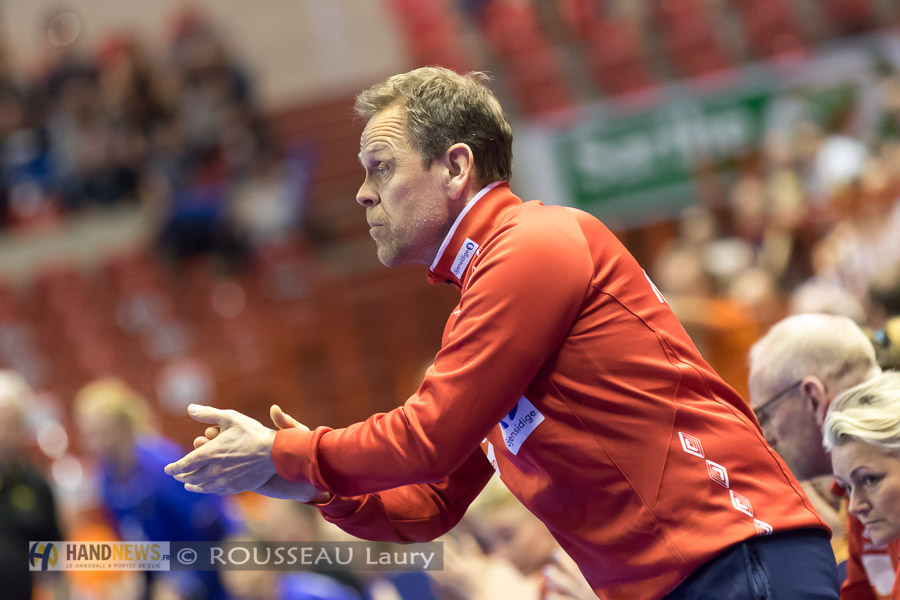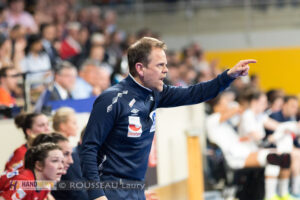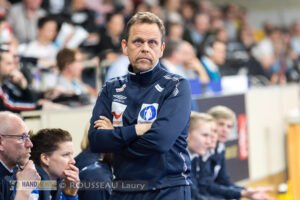Norway
T.Hergeirsson : "We always think about development"

Shortly after the Golden League, Þórir (Thorir) Hergeirsson, the IHF world's best coach 2016, gave to Handnews.fr an exclusive interview. He agreed to talk about Iceland, his native country, but also about devlopment in handball, Norway or France. A very interesting talk.
Handnews : Thorir, you won the best coach in the women category a few days ago. for the fifth time. Do you want some more or is it enough ?Thorir Hergeirsson : (Smiles) You know, you've got a lot of very good handball coaches nowadays. This award is not only for one person, it rewards a culture, the Norwegian handball culture. There are many people who work hard for the team to get good results.
First of all, there are the players who work very hard, who have high ambitions and big motivation for training and getting better every time. There are also my colleagues, the coach team and the trainer team - Mia-Hermansson Hogdahl and Mats Olsson - who are very good coaches. They know a lot about handball and have been top players themselves. They both played a lot of international matches. I'm the head coach but they coach with me. I think we are a good team. The people around the team are also very important : the medical staff, the physiologist and all the persons who help us. And this award is also for all the clubs in Norway which do a great job with the players. This prize is thus an honor for all the people of the Norwegian culture. You know, if a team wins the World Championship or the Olympic Games, the coach of this team will be chosen. But we like to think that this is for everybody in and around the team.
HN : You are now one of the most famous coach in handball. But how did you get to this sport ?T.H. : I’m from Iceland, from a very small town called Selfoss. It's not very far from Reykjavik and used to have around 5000 inhabitants. It now has around 7000. When we were young, we played football, handball, athletics, swimming and a lot of others activities. It’s normal in Iceland to try several sports. Selfoss is small town which means that there are not so many players and only one club ; UMF Selfoss. So you have to participate in more than one sport. I learned how to train a lot when I was swimmer (9-14 years old) , swimming is a sport with lot of training !
When I was 12-13 years, I started with handball. I used to play mostly football and swim before that. When I was 14 we got a new sport hall and two years later I started as a coach for the young teams. At this time, and, once again, because it was a small club, you could be a board member, a coach and a player. This was quite normal in Iceland in these days…
Then I started to study sports and I move to Norway when I was 22 to study sports at the Norwegian School of Sport Sciences in Oslo. I was planning to stay there for only 3 years ! I wanted to study and to play handball in first league. But I got injured. And it was complicated for me. Then I started coaching a team in Norway while studying because I needed money and also some practical exercices for my studies. I planned to play again after my injury but I never started playing again at the top level, I just played a little bit with the second team. I studied at the universtity of sport for 6 years and I get a master in sports psycology and coaching. Then, I started coaching full time, men teams in Oslo then in Elverum where I stayed five years to coach the men team also.
"Very early I was thinking more as a coach"
HN : Does it mean that when you arrived in Norway, you didn’t have in mind to become the coach you are now ?
T.H. : Well, maybe… You know when I was young I always had had this "coach point of view" inside of me. I was always asking questions : why do we do that ? Why can’t we do like this ? I was not a top player at this time, but I was average but I thought a lot as a coach already. I was always curious about why the coach thought like this or this. In fact, very early I was thinking more as a coach. But I never planned to be a national head coach. That's the sort of things that come if you do a good job. If you do a good job, maybe you get the gratitude. This why I’m here. I’m coaching and training teams since I was 16 years. I’ve been coaching every year since : young teams, all teams, top players, not so top players, women, men, girls, boys… Now I’m 53, so this is my exeperience and I like being a coach.
 HN : Back to 2009, you became the head coach of Norway. Before you Marit Breivik won a lot of titles. How did you manage to keep Norway on the way to victory ?
HN : Back to 2009, you became the head coach of Norway. Before you Marit Breivik won a lot of titles. How did you manage to keep Norway on the way to victory ?
T.H. : Once again, it's also thanks to a lot of factors. As I said, there are many pepole who work hard for the team. In 1994, I was the coach of Elverum, in the men first league. At the same time, Marit started as head coach of the women national team and he asked me if I wanted to coach the women junior national team. Actually, this was the first time we started working together. Then, I was coaching a club team and a national team for some years. In 2001, we started working together for the women adult national team, he was head coach and I was the coach. We worked together until European Championship in 2008.
When I started to be the head coach, I knew there were possibilities for the team to be even better. There were young players coming up and the possibility to get good results. In Norway we always think about developement, we don’t talk so much about results.
HN : Talking about developement must be one of the secrets of the Norwegian handball culture isn't it ?T.H. : Exactly. If you don’t develop, you don’t win. You can develop and not win, but it’s more likely that you can win if you develop. This is my motivation, all the time. This is our motivation, in fact : mine but also the one of my coaching team, Mia and Mats, our good experts in the Olympic team like the psychologists, physiologists, physical trainer want to develop ourselves and the players also who are never satisfied. They always want to learn new things to get even better.
If I wouldn't want to develop any more, I would quit. Because I wouldn't think about winning more. In fact, you don’t have to think about this, because all the people around you talk about only one thing : "The Norwegian women team is going to win". They say : "Ok Thorir, you have to win this game because it’s easy". Even if it's not ! That’s why we, as a whole team, think about developement and not about the results.
We all know that we are depending on results of course, I’m not stupid. I know that, as a head coach, if you win you keep the work and if you lose a lot of matches, you lose the job. Thinking a lot about results, you only get stressed !
Here, we have one leitmotiv that says : "The things we are good at : you have do it more. The things we are not so good at : you have to develope it." And the third category is : "Learning new things". We always want to learn new things, things we haven’t done before. These are the three categories of developement in our culture.
"We like to get inspired by our biggest opponents"
HN : When you talk about new things... In 2016 you said : « We learn a lot in defense from France ». Does it mean that even Norway has to learn things from other teams ?
T.H. : Yes, of course. We like to get inspired by our biggest opponents. We have a lot of respect for these good teams. Over the past years, the level of woman handball has been increasing. A lot of teams are playing better and you have more close games at the top. You can learn a lot from different cultures. From the French one, for example, we've been inspired by its physical aspect and fitness and, of course, by their defense because they have strong individual qualities. I could also talk about the speed of the Netherlands or the tactical plays of the Balkans and Russian teams. The Danish culture is also interesting because they have good technical players and very good individual and technical skills in attack. As you can see, there is a lot of inspiration. We also learn a lot of men handball. The girls like to look at men players to learn more technical skills.
HN : Because you started with men, do you have a word about what Norway did during the last World Championship in France ?
T.H. : The male team has been developing for a long time now. In Norway, we have some cooperations between men and women teams. So I know that they worked very hard over the last years both in clubs and in national teams. And I’m sure they can get even better, they have possibilities to bright future.
 HN : What do you think about the Norwegian women championship ? Do you think that it could be a problem for Norway if Larvik kept leading the championship so easily in the future ?
HN : What do you think about the Norwegian women championship ? Do you think that it could be a problem for Norway if Larvik kept leading the championship so easily in the future ?
T.H. : This has been no problem for the past 20 years. According to me, the problem now is that Larvik has to face some financial difficulties and will lose some very good players soon, which is pity. I think this is more critical than Larvik being the best team in Norway. Why not ? Because they have ambitions, they play the Champions League every year, the national players get good challenges... I can understand that it’s not so good for the excitement of the national league but in Norwegian national league there are a lot of small clubs where young players can play. There, they are key players and they learn a lot. It's important for them to be key players in these clubs. And when they get to a higher level they can go to Larvik to play the Champions League or they go to foreign clubs to play the Champions league as well. All of this is good for the national team because we have now three categories of players in the national team : the youngs ones who play key roles in their clubs in Norway ; some other key players playing in Larvik and the rest of them playing in good clubs in Europe. It brings good variations to everybody.
HN : Does it mean that, according to you, having nine of your players playing abroad is not a problem?T.H. : No, it's not. In Paris, for example, Stine Oftedal had a good developement for her. It was the kind of club she needed for a time. And now she is ready for a biggest challenge. Once again, we always think about developement. Of course she could have kept developing in Norwegian club, for example in Larvik. When you’re young, you can play in the norwegian clubs, that's very positiv. But players need to know that if they want to be a keyplayer in the national team, they have to play the Champions league or, at least, a European cup.
HN : What’s your opinion about the French Championship ?T.H. : We have seen a lot of matches with French teams. I think that the French league has been developing for the past years and is now a tougher league with better players. Clubs are getting better results in European cups. So definitely, French women handball is growing up. This is good for international women handball as well. But I hope that French clubs will manage financially because we know that if you have big ambtitions and you want to be the best in Europe it costs a lot of money. It is not easy to compete with clubs like Gyor for example which has a lot of money. Larvik tried this and they know now that is not possible. They have to think different – do it the Larvik-way.
"If you work together, you can beat everyone."
HN : To conclude, we know that you don’t really like to talk about your personality. But we read an interview where people say that you have a good sense of humour…
T.H. : (He cuts) I like to think that I have a good sense of humour ! HN : And people also say that you are a hard-worker. Do you agree with these two main characteristics ?
HN : And people also say that you are a hard-worker. Do you agree with these two main characteristics ?
T.H. : I can laugh of myself together with people. It’s not a problem. I grew up with this culture. In Iceland you look at the bright side. We are a small country, we are not so many. We have to work hard and to work together. If you work together, you can beat everyone. Handball is only 7 against 7. You don't play Russia against Iceland with millions of people against 300 000. It’s only 7 people on the court. It means that we don’t need more than 16 players to have good team. And we don’t need to be a million to have a good handball team ! This is even easier if you don’t have so many players because you have the control and you see everything, you’re closer to the players.
On the other hand, my culture is hardworking. Icelandic always have to work hard beacause we have a culture with tough conditions and the only way to get something is to work hard. Everyone has the same culture in the Norwegian national team : working hard and trying to get better every day, this is a key for beeing abbel to get good results.
HN : And nowadays, Iceland is good in handball but is now very good in football too...
T.H. : These success show all the possibilities in team sport. The best team is not the one which has all of the top players : if you put the 16 top players on the field you will not necessarily have the best team. Having so many stars in your team can even be a problem because sometimes they get bigger than the team. It's not the case in our philosophy : the team is always first.
The team itself will live forever. But the coach comes and then leaves and an other one comes and so on. Same thing for the players : they come, then change clubs, quit... And new players arrive. But the team is always here. That’s why the team is most important. Nobody in our team, Nora Mork, Heidi Loke, Kari Grimsbo or Thorir, is bigger than the team. We are just a little part of the team. Everybody is important but nobody is more important than the team. This is our philosophy.
Clément Domas & Maxime Cohen